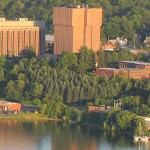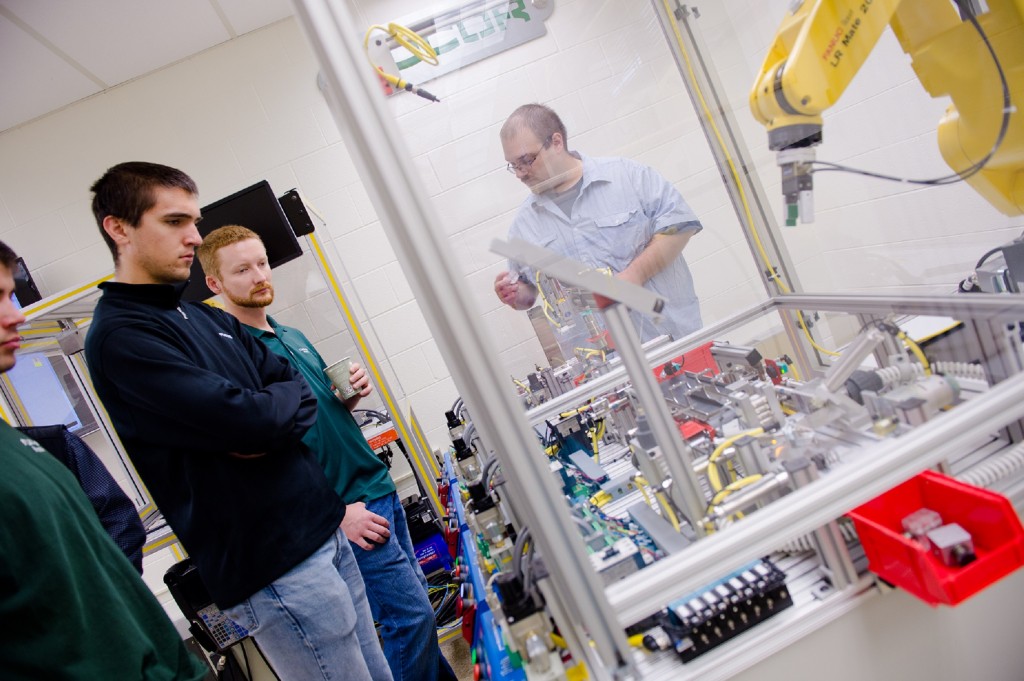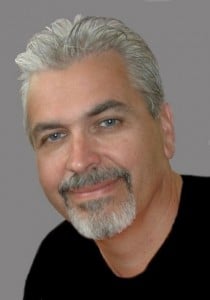
The ECE Department is deeply saddened to learn of the sudden and unexpected death of Larry Kennedy, Chair of the ECE External Advisory Committee. His positive energy and generous spirit were a blessing to all who worked with him. He will be missed terribly by the ECE Department and the EAC. For a full obituary, see www.randallroberts.com
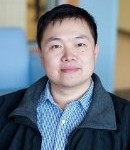 Imagine the smart home of the future. Thanks to a central controller and wi-fi, not only does the thermostat power up and warm or cool the house as you are heading home. Smart light bulbs come on low at dusk and brighten up as the sky gets darker; your washing machine starts a load of clothes when the electricity is cheapest; your smart refrigerator thaws the roast in one section, while another keeps your cheese ready to slice and yet another chills your beer. The doors lock automatically behind you and unlock as you—but no one else—approach. A 2-way nannycam lets you keep an eye on the kids while a sprinkler waters your lawn when water demand is lowest.
Imagine the smart home of the future. Thanks to a central controller and wi-fi, not only does the thermostat power up and warm or cool the house as you are heading home. Smart light bulbs come on low at dusk and brighten up as the sky gets darker; your washing machine starts a load of clothes when the electricity is cheapest; your smart refrigerator thaws the roast in one section, while another keeps your cheese ready to slice and yet another chills your beer. The doors lock automatically behind you and unlock as you—but no one else—approach. A 2-way nannycam lets you keep an eye on the kids while a sprinkler waters your lawn when water demand is lowest.
Read More
Michigan Technological University’s award-winning Peace Corps Master’s International (PCMI) program is offering new degree options for students in two departments: computer science and electrical and computer engineering (ECE). The School of Forest Resources and Environmental Science is also expanding its PCMI programs to include a Master of Geographic Information Science.
Read More
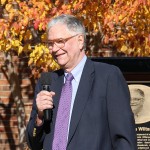 The unveiling of the first Legacy Marker for Alumni Way was held in front of the EERC. The Legacy Marker serves to honor someone associated with Michigan Tech, and it was unveiled and presented as a surprise to the Dennis O. Wiitanen, Professor Emeritus, Electrical and Computer Engineering.
The unveiling of the first Legacy Marker for Alumni Way was held in front of the EERC. The Legacy Marker serves to honor someone associated with Michigan Tech, and it was unveiled and presented as a surprise to the Dennis O. Wiitanen, Professor Emeritus, Electrical and Computer Engineering.
Dennis O. Wiitanen received the B.S. and M.S. degrees from Michigan Tech in 1963 and 1967 respectively, and the Ph.D. degree from the University of Missouri-Rolla in 1970, all in electrical engineering.
In 1970, he joined the electrical and computer engineering department at Michigan Tech, where his major research interests were in the areas of insulating materials and power systems. Dr. Wiitanen taught courses in both electric machines and power systems for over forty years. He is currently a Professor Emeritus.
Dr. Wiitanen is a member of the IEEE’s Power Engineering Society, Education Society, Industry Applications Society, and Dielectrics and Electrical Insulation Society, serving on several committees and subcommittees, and is a Registered Professional Engineer in the State of Michigan.
See the Video from UpperMichiganSource
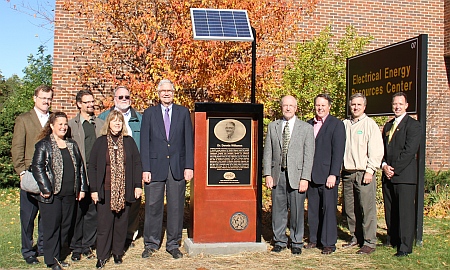
A ceremony was held Monday to celebrate completion of the new Nucor Industrial Control and Automation Laboratory in the Electrical Energy Resources Center. The state-of-the-art facility was made possible by a $255,000 gift from Nucor Corporation, the largest manufacturer of steel products in North America.
The laboratory is a collaborative effort of Electrical Engineering Technology in the School of Technology and the Department of Electrical and Computer Engineering in the College of Engineering. It is an example of cooperation within Michigan Tech’s new Alliance for Computing, Information and Automation (ACIA), which combines common interests among established academic units to better equip future graduates and to align research activities with contemporary technological challenges.
The laboratory consists of eight portable Amatrol Programmable Logic Controller (PLC) Learning Systems, equipped with Allen-Bradley CompactLogix 5300 PLCs and Human Machine Interface (HMI). These trainers enhance the teaching of PLC concepts and HMI programming using the latest generation of PLCs. The new technology also includes a fluid flow Process Control Learning System equipped with a Honeywell PID controller and four mechatronic stations fully integrated with a Fanuc Robotics System, enabling teaching of advanced concepts of PLC programming and overall system troubleshooting skills.
PLCs are an integral part of nearly all industrial processes today. A PLC is a digital computer used for the automation of a variety of electromechanical processes, including temperature ranges, immunity to electrical noise and resistance to vibration and impact. PLCs are often integrated with robotic technology.
“Graduates who will be employed in industries utilizing these systems must not only have basic knowledge of PLCs and robotics, but also the skills to integrate these systems,” said Jim Frendewey, dean of the School of Technology. “The knowledge and experience students receive will produce well-educated graduates with practical, hands-on experience designing, configuring and troubleshooting industrial control systems.”
Dan Fuhrmann, chair of electrical and computer engineering, said, “Knowledge and experience in control systems has been the single most sought-after skill set from our corporate recruiters looking to hire electrical engineering graduates, for the past several years. With the Nucor Laboratory we will take a major step forward in meeting the demands of industry and open up opportunities for our students.”
President Glenn Mroz emphasized the importance of the new lab as he spoke to those in attendance at the ceremony. “Michigan’s economy has gone from one of the worst to 16th for growth among the states in a very short time,” he said. ”We’re now in a renaissance in manufacturing, and the people graduating today have the knowledge and skills because of companies like Nucor who have made substantial investments in the education of Michigan Tech students. We realize that this represents a commitment both by Nucor and our faculty and staff that only comes about when people have a clear bead on priorities. We’re thankful to Nucor for helping our students have the best.”
Kurt Kalenauskas, an electrical engineering technology senior, said he is “jealous of the new students who get to learn and work with the equipment and technology the Nucor laboratory has to offer.”
Nucor has an established relationship with Michigan Tech that began in 2008, when the company sent two representatives to a Career Fair. They were so impressed that they asked Career Services how Nucor could help Michigan Tech help its students. Since then, the company has become a Career Services Gold Partner, providing financial support and sending several representatives to campus before each Career Fair to work directly with students on interview and resume preparation.
“Nucor recruits technical talent and future leaders at Michigan Tech because Tech graduates have proven to be successful Nucor teammates,” said Dave Davolt, electrical supervisor at the company. “Nucor’s relationship and involvement with Michigan Tech has grown stronger over the years. This is evident with Nucor’s investment in technology relevant to today’s manufacturing industry. With these investments and partnerships, Nucor hopes to better equip students for postgraduation opportunities, which we hope they seek with Nucor. “
Aleksandr Sergeyev, an associate professor in the School of Technology with a special interest in robotics, will head the new laboratory, with faculty from both Electrical Engineering Technology and Electrical and Computer Engineering teaching there. Hundreds of students each year will participate in laboratory activities, and those numbers are expected to grow with future development of new advanced courses made possible by the capabilities of the lab.
Shiyan Hu to Attend NAE Frontiers of Engineering Symposium
Associate Professor Shiyan Hu (ECE) has been invited to attend the National Academy of Engineering’s EU-US Frontiers of Engineering Symposium.
He is among only 62 researchers from the European Union and the United States to receive an invitation to the symposium, to be held Nov. 10-12 in Seattle.
The symposium brings together outstanding, early-career engineers from industry, universities and other research institutions to introduce their research and work toward forming partnerships and collaborations.
The attendees are under age 45 and may only be nominated by NAE members or senior executives from leading industrial companies.
The symposium will feature presentations on Energy Storage Across Scales, Protein Design for Therapeutic Applications, Smart Homes, and Atoms to Airplanes: Designer/Engineered Aerospace Materials. Hu’s research addresses cybersecurity in smart homes, and he recently received a CAREER award for his efforts to design faster computer chips.
The event is hosted in partnership with the European Council of Academies of Applied Sciences, Technologies and Engineering and the National Academy of Technologies of France.
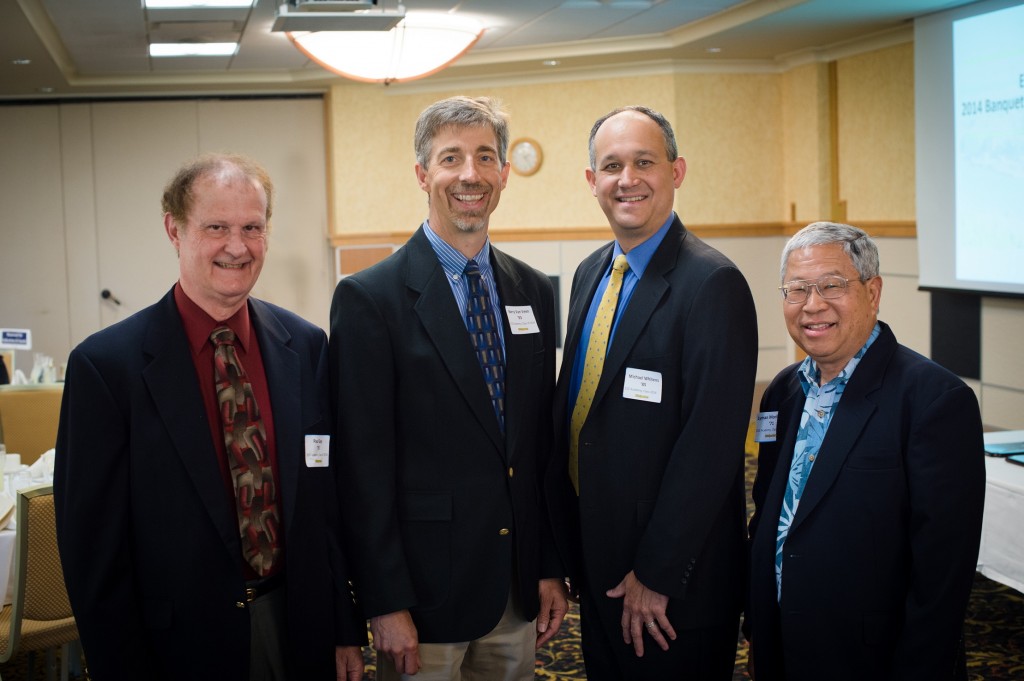
The Department of Electrical and Computer Engineering welcomed five of its outstanding alumni to the ECE Academy, Class of 2014, at an induction ceremony held on Wednesday evening, August 6, in the Memorial Union Building Ballroom on the Michigan Tech campus. Inductees for the Class of 2014 are H. Paul Gay ’70, Lawrence Laurich ’65, Lyman Morikawa ’71, Barry Van Veen ’83, and Michael Whitens ’85. Mr. Laurich was unable to attend the ceremony due to illness and will be presented his induction plaque next week during a visit from Department Chair Dan Fuhrmann.
The inductees and guests also enjoyed a special message from guest speaker George Swenson, Jr. ’44. Dr. Swenson’s father was the founding chairman of the EE Department in 1928.
The purpose of the Academy is to honor outstanding graduates of the Department of Electrical and Computer Engineering at Michigan Technological University. Election to the Academy is made by the Executive Committee of the faculty, and recognizes excellence and leadership in the engineering profession and civic affairs. This induction honors some of the most successful of the over 8,800 ECE alumni of Michigan Tech. Portraits of the new Academy members will be added to the prominent display in the lobby of the EERC building, to inspire and motivate future generations of students in electrical and computer engineering.
For more information see ECE Academy.
Back in the day, actual human beings wired computer circuitry by hand. Then along came integrated circuits, and now the technology is so advanced that tens of billions of transistors can be put on a single chip no bigger than a dime. The complexity of these nanoscale integrated circuits makes it difficult to make the most of their design, says Zhuo Feng, an assistant professor of electrical and computer engineering at Michigan Technological University. That’s because software used to design computer chips hasn’t kept pace with the hardware in these emerging computing systems.
MORE
When you get sick, your physician may take a sample of your blood, send it to the lab and wait for results. In the near future, however, doctors may be able to run those tests almost instantly on a piece of plastic about the size of credit card.
MORE
